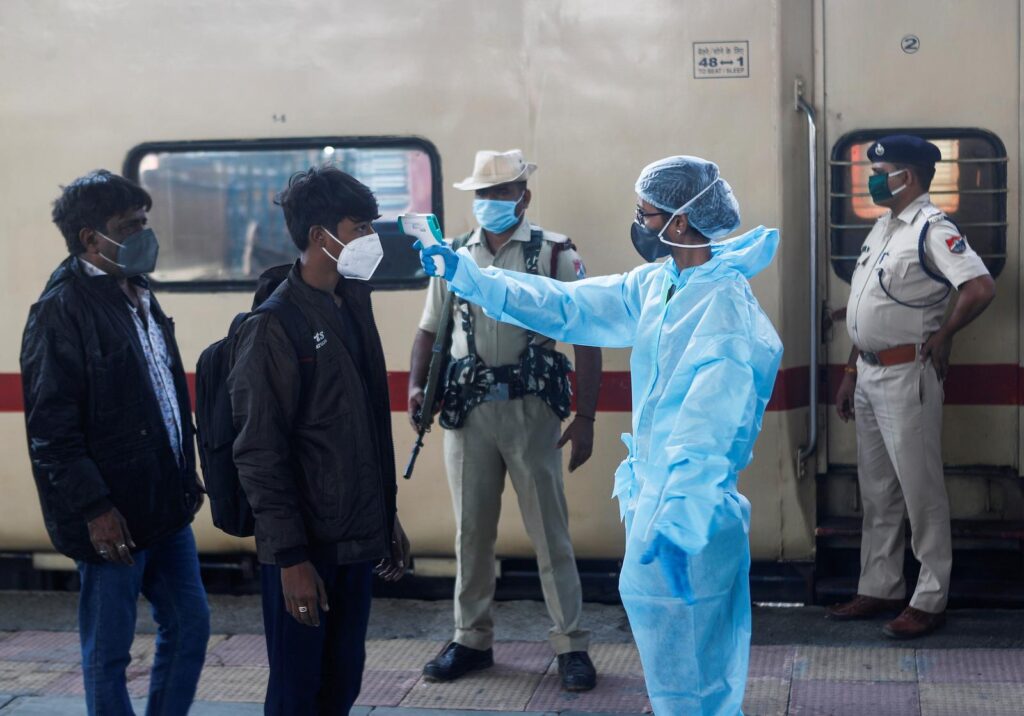Covid-19 Rebound? 6,050 New Cases, Highest In Over 6 Months
Apr 7, 2023 | Pratirodh Bureau
FILE PHOTO: A health worker checks the temperature of passengers at a railway station, amid the spread of the coronavirus disease in Mumbai
India reported 6,050 fresh Covid-19 cases and 14 deaths in the past 24 hours, the highest in over six months, according to the Union Health Ministry’s update on Friday. Thursday’s Covid-19 cases are the highest in 203 days. India last crossed the 6,000-mark on September 16, 2022, when 6,298 cases were reported.
With Thursday’s cases, the active number has increased to 28,303 and death toll has risen to 5,30,943. Of the 14 deaths, three were reported from Maharashtra, two each from Karnataka and Rajasthan, one each from Delhi, Gujarat, Haryana, Himachal Pradesh, Jammu and Kashmir and Punjab, and one was reconciled by Kerala.
The daily positivity rate has been recorded at 3.39 and the weekly positivity rate at 3.02.
The total tally of Covid cases stands at 4.47 crore (4,47,45,104)
The active cases now comprise 0.06 per cent of the total infections, while the national Covid recovery rate has been recorded at 98.75 per cent, according to the health ministry’s website. It adds that the number of people who have recuperated from the disease has increased to 4,41,85,858, while the case fatality rate has been recorded at 1.19 per cent.
The surge in Covid-19 cases in India has coincided with the rising prevalence of XBB.1.16 strain of Covid-19. Earlier, experts had said that this strain could be behind the Covid-19 surge in Delhi.
XBB.1.16 In 38% Indian Cases: INSACOG
The XBB.1.16 strain of Covid-19 variant is behind 38.2 per cent of all Covid-19 cases in India, according to a bulletin by Indian SARS-CoV-2 Genomics Consortium (INSACOG).
The INSACOG is a consortium of 54 laboratories to monitor the genomic variations in the SARS-CoV-2, the virus that causes Covid-19 disease. It tracks the emergence of variants and sub-variants.
The bulletin of March 27, which was released on Thursday, said among the samples collected till the third week of March 2023, XBB continued to be the most commonly circulating Omicron sublineages.
Noting that Omicron and its sublineages continue to be the dominant variants in India, the bulletin said an increase in infection rate has been observed, especially in western, southern and northern parts of India.
“A newly emerged recombinant variant XBB.1.16 has been observed in different parts of India, accounting for 38.2 per cent of the infection till date,” the bulletin said.
The bulletin further said a few BA.2.10 and BA.2.75 sublineage cases were detected in some part of the country whereas XBB was the most prevalent sublineage of the Omicron variant.
The INSACOG said globally, nearly 3.7 million new cases and 26,000 deaths have been reported in the last 28 days. During week nine of the year 2023, there has been a continued increasing trend in the proportions of recombinant lineages globally, it said.
What We Know Of XBB.1.16 Covid-19 Strain
Like any other virus, SARS-CoV-2 has evolved and acquired a number of mutations over time. These mutations lead to the emergence of several variants and sub-variants.
Variants of the virus evolve further and make sub-branches called sub-variants. Some of the well-known variants are Alpha, Delta, and Omicron. They have several sub-variants. For example, the Delta variant that led India’s deadly second Covid-19 wave has up to 200 sub-variants. In common terms, any mutated form of the virus is called a strain. It can refer to both a variant and sub-variant.
The XBB.1.16 variant is a recombinant — a mixture, simply speaking — strain of BA.2.10.1 and BA.2.75 sublineages, according to the World Health Organization (WHO).
The WHO notes that XBB.1.16 was first documented on January 23. It is currently designated as a variant under monitoring along with other variants.
Notably, BA.2.10.1 and BA.2.75 are both sub-variants of highly transmissible variants of Omicron. Recently, another sub-variant of Omicron named BF.7 was believed to be fuelling the deadly Covid-19 wave in China.
So far, the WHO has said that the strain is more transmissible but there is no information that it’s more severe.
“Most of the sequences are from India and XBB.1.16 has replaced the other variants that are in circulation, so this is one to watch,” said Dr. Maria Van Kerkhove, technical lead for Covid-19 response at the WHO, as per ABC News.
“So far, reports do not indicate a rise in hospitalizations, ICU admissions, or deaths due to XBB.1.16. Further, there are currently no reported laboratory studies on markers of disease severity for XBB.1.16. Mutations at position 478 of the SARS-CoV-2 spike protein have been associated with decreased antibody neutralization, increased transmissibility, and pathogenicity,” said WHO, as per ABC.
